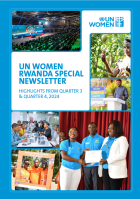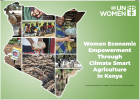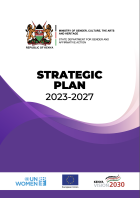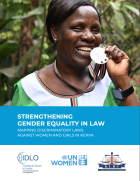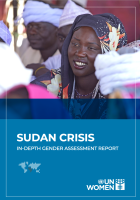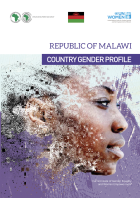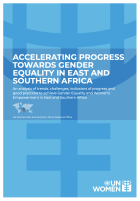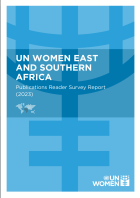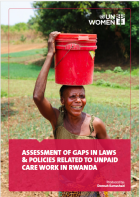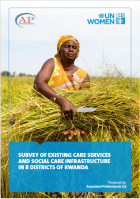1 - 20 of 56 Results
Pagination
Date:
This newsletter highlights some of UN Women`s key milestones made in advancing gender equality and women`s empowerment in Rwanda in the period of July - December 2024
Date:
This study provides an overview of the kinds of administrative data on discrimination and inequality currently being produced in 22 countries across Africa. It also identifies the data and capacity gaps as well as other barriers that prevent this kind of data from being used for statistical purposes. The recommendations of the study are aimed at helping producers and users of administrative data and statistics on discrimination and inequality improve the availability and accessibility of quality data. This can be done by for example improving data governance and statistical coordination, amongst other interventions. Increased accessibility and regular publication of this data will also contribute towards greater uptake and use and ultimately more informed decision making and better monitoring of discrimination and inequality on the continent.
Date:
The UN Women Kenya Annual Report highlights key achievements in advancing women’s empowerment and gender equality.
This report showcases progress in increasing women’s leadership and political participation, strengthening economic empowerment, eliminating violence against women and girls, engaging women in peace and security efforts, and enhancing planning and coordination.
UN Women Kenya remains dedicated to building a future where women are at the heart of developing resilient and sustainable communities.
Date:
This analysis of laws from a gender perspective was undertaken to provide an in-depth understanding of the current legal framework in both Tanzania Mainland and Zanzibar, and to identify gaps and discriminatory provisions with the long-term vision of advocating for legal reform. This brief provides a summary of the analysis exploring the gender responsiveness of laws and recommendations on discriminatory provisions and gaps that require repeal, amendment or enactment.
Date:
This analysis of laws from a gender perspective was undertaken to provide an in-depth understanding of the current legal framework in both Tanzania Mainland and Zanzibar, and to identify gaps and discriminatory provisions with the long-term vision of advocating for legal reform. The analysis explores the vast spectrum of laws to assess their gender responsiveness, and highlights discriminatory provisions and gaps that require repeal, amendment or enactment.
Date:
The WEE-CSA Storybook showcases the success stories of over 2,400 women from Kitui, Laikipia, and West Pokot who have transformed their lives through climate-smart agriculture. Funded by KOICA and implemented by UN Women Kenya, it highlights the project's impact on livelihoods and gender equality while sharing valuable lessons learned. This collection celebrates resilience and aims to inspire further community upliftment for sustainable development in Kenya.
Date:
Accessing accurate information on and services for regular migration is not easy; Ethiopian women may rely instead on informal networks and unregistered recruitment agencies. Ethiopian migrant women travelling via irregular overland routes, as opposed to travelling by plane, face high risks of sexual and gender-based violence, including trafficking for forced labour and sexual exploitation. Upon reaching their destination countries and taking up domestic work, they often face abusive and exploitative situations. Health issues, including physical injuries and high rates of suicide, are widespread among Ethiopian migrant women domestic workers. Despite these harsh realities, some women secure relatively high salaries in comparison to those in Ethiopia and send significant portions of their salaries home to support their families. Upon returning to Ethiopia, many women face stigma, limited economic opportunities and psychological distress. Limited gender-responsive reintegration support further complicates their efforts to rebuild their lives and attain economic independence.
Date:
The Publication is a detailed strategic plan for the period 2023-2-27. It highlights previous achievements, lessons and emerging issues that define the policy direction of the gender sector achieving a society free from gender discrimination and violence
Date:
Under the leadership of the Ministry of Gender, Child, and Social Welfare, in collaboration with the Ministry of Peace Building, and with support from UN Women and international funding, the Women’s Charter empowers women and girls to engage with the Reconstituted National Constitutional Review Commission (R-NCRC). Launched on May 29, 2024, in Juba, the Charter addresses twelve critical themes, advocating for comprehensive legal, policy, and programmatic interventions in the Permanent Constitution-making process.
Date:
UN Women and International Development Law Organization (IDLO), in partnership with the Kenya Law Reform Commission. Researcher/writer: Dr. Consolata Ngondi; Ms. Petronella Mukaindo
Date:
This advocacy brief provides an overview of the trends in terms of Gender Based Violence (GBV) as a human rights violation in the southern Africa sub-region.
Date:
This Regional Coordination Strategy articulates how UN Women will leverage its unique triple mandate—encompassing normative support, UN system coordination, and operational activities—to mobilize urgent and sustained action to achieve gender equality and the empowerment of all women and girls and support the achievement of the 2030 Agenda.
Date:
This report highlights the existing social care infrastructure, and the most needed and cost-effective solutions that can contribute to the reduction and redistribution of unpaid care work in Rwanda.
Date:
The assessment utilized the gender inequality framework used in humanitarian settings. The framework considered how the gender inequalities prevalent in pre-conflict contexts are exacerbated by conflict dynamics and how the impact differs with different gender roles. The framework indicates that the humanitarian responses should consider the basic livelihood needs and investigate and address some strategic issues that promote
Date:
The Malawi Counrty Gender Profile publication presents a review of existing gender issues identified through a review of documents and reports recently released. The generic purpose of Country Gender Profile is to strengthen national understanding and data on the advancement of international, regional and national commitments towards Gender Equality and Women's Empowerment.
Date:
The Report highlights the imperative and urgent need to have men, along with women, become gender equality activists and work towards violence-free, inclusive societies. An important reflection on masculinity sheds light on how toxic masculinity models not only harm women and girls, but the majority of men and boys too. In this regard, gender equality really matters for both men and women, and requires both to join their efforts to realize it.
Date:
UN Women East and Southern Africa Regional Office initiated a biennial survey for 2021-2022 publications to analyze readers' evaluation of the leading publications in terms of several attributes, facilitate continuous improvements in UN Women's publications and draw lessons for conducting future readership surveys. The survey was also meant to consult the audiences on their perception of publications' readability, presentations, design and layout.
Date:
This Initial Rapid Gender Assessment provides information on the different needs, capacities, and coping strategies of women, girls, boys, and men in Sudan. These needs are presented as follows: (a) Needs requiring immediate attention and, (b) Needs requiring mid-term interventions.
Date:
From cooking and cleaning, to fetching water and firewood or taking care of children and the sick and the elderly, women do at least two and a half times more unpaid household and care work than their counterparts. As a result,they have less time to engage in paid labour due to working longer hours,combining paid and unpaid labour.
Date:
The likelihood of "economic disempowerment" is increased due to the unequal load of unpaid care duties placed on women and the human development outcomes of both the women and those being cared for may be impacted because women in the paid labor market may not be able to adequately fill their caregiving duties (Deepta & Zambelli,2017).

